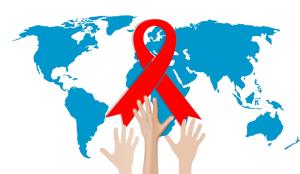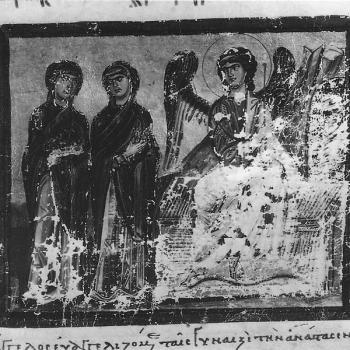December 1st marks the 35th anniversary of World AIDS Day. For those unfamiliar with the observance, World AIDS Day serves to raise awareness about HIV/AIDS. It exists to help dispel common myths about HIV/AIDS as well as the stigmas that surround the disease. It is also a day of remembrance for those who have died as a result of the worldwide pandemic. According to the World AIDS Day page at hiv.gov:
“Through remembrance, we draw strength and determination to redouble our efforts in fighting the disease and providing support to those with HIV. It’s time to remind ourselves of the importance of compassion, empathy, and solidarity in the face of adversity.”

Recently I received an email request to add a link to Sanctuary’s “resources” page. The page supposedly contained health information geared for the LGBTQ+ community. Upon a review of the page, it cited several long-held myths, especially those relevant to HIV/AIDS. It surprised and didn’t surprise me at the same time. It seems like no matter how many years go by, there is a certain level of mythology woven around HIV infection. And now, as it doesn’t get as much notoriety as it once did, the myths about HIV infection seem more pervasive than ever before.
As an HIV educator and rapid testing certified HIV counselor, there’s no better way to acknowledge World AIDS Day than promoting proper information about HIV. The more we speak truth, the more we dispel fear. So here, we will discuss seven common myths about HIV/AIDS and provide correct information in their place.
HIV/AIDS myth #1: AIDS is different from HIV
HIV stands for “Human Immunodeficiency Virus.” Minus the big word in the diagnosis, HIV attacks a person’s immune system by destroying CD4 blood cells. These cells work to protect the body from invading pathogens; thus, HIV destroys the body’s natural ability to fight off infection. As the infection progresses, HIV infected cells replicate and replace healthy cells. Individuals with HIV face the possibility of serious illness from something a normal immune system would easily fight.
AIDS stands for Acquired Immune Deficiency Syndrome. It is not an illness separate from HIV, but is late-stage HIV disease. When a person’s CD4 count is 200 or lower, one is said to have AIDS. This distinction is now made because the disease is diagnosed earlier and people are able to live longer with it. As a result of drug advances, there are many HIV patients who never see the disease progress to AIDS.
HIV/AIDS myth #2: HIV is a thing of the past
It’s an extremely common myth that HIV infection is a thing of the past. While it is true that infection rates are down (especially from their peak in 1995), there are still new cases of infection, even today.According to unaids.org:
- Approximately 1.3 million people were infected with HIV in 2022
- 46% of new cases are women and girls; in sub-Saharan Africa, women and girls account for 63% of all new infections
- In 2022, HIV prevalence among the adult population (ages 15-49) was 0.7%; it was 2.5% among sex workers, 7.7% among gay men and other men who have sex with men, 5.0% among people who inject drugs, 10.3% among transgender persons, and 1.4% among people in prisons
People still contract HIV. Yes, it is possible to contract HIV, even from one act of unprotected sex. There remains no known cure.
HIV still very much exists.
HIV/AIDS myth #3: People with HIV are a threat to the health of non-infected persons
Someone who has a healthy immune system is far more of a threat to someone with HIV than someone with HIV is to them. An individual with HIV is far more likely to become seriously ill as a result of a common or ordinary illness than someone with a healthy immune system. They would pick this up from, most likely, someone with a healthy immune system who doesn’t think twice about failing to cover their mouth when they cough or not covering their nose when they sneeze.
HIV/AIDS myth #4: HIV is a “gay disease”
When I teach on HIV prevention, I point out that viruses don’t know a thing about the person they infect. No virus stops to ask the person it’s about to infect the gender of the person they’ve slept with, who they find attractive, or what their personal pastimes are.
The United States of America is the sole nation still insisting HIV is a “gay person’s disease.” The number one transmission for HIV worldwide is heterosexual sex, not homosexual sex. Contrary to what some might think, it is not a “gay disease,” “junkie disease,” “prostitute disease,” or anything of that nature.
HIV/AIDS myth #5: HIV is a punishment for sin
Among the various myths about HIV/AIDS is the painful idea that HIV is a divine punishment. If HIV was a punishment for sin, everyone would have it. Why, you ask? Because every one of us is a sinner. Scripture doesn’t divide up sin into lesser or greater sins, thus the idea that HIV is a special punishment for “special sins” is theologically abhorrent. If HIV is a punishment for “sexual sin” as people state, an awful lot more people ought to be in line at the dispensary to get their medication.
None of us know the circumstances surrounding someone’s HIV infection and none of us have the right to stand in place of judgment.
HIV/AIDS myth #6: Abstinence-only education is a solution to prevent HIV
Abstinence-only sex education has proven a marked failure. The reason it doesn’t work is not because abstinence is impossible to maintain (contrary to popular belief, not everyone wants to have sex all the time). It’s also not because abstinence is a bad thing. Abstinence-only education does not equip for real-life choices people face in sexual situations. Its basic theory is that every sexually transmitted disease can be solved by waiting for marriage. As a side point, it feels information about sexuality encourages sexual promiscuity. The hope is that moral judgment will supersede facts, and that said moral judgment will answer any sexual situations that may arise.
In theory, abstinence-only education sounds good; it sounds moral. The problem, however, is that it’s not giving people the information to make their own choices as pertain to sexuality. Most abstinence-only sex ed programs include the following:
- A lack of detail and scientific information
- An exclusively heteronormative, penetrative intercourse view of sexual practice
- Penetrative sex is the ultimate thing that will change your life
- It gives the message that there are no other ways to acquire an STI (if there’s no penetration, people don’t believe it counts as sex) outside of heterosexual penetrative sex
- The focus of people’s lives is still all about sex as they live their lives around trying to avoid it
Whether someone has sex, doesn’t have sex, waits until marriage, or has it prior doesn’t change the fact that information is necessary. Education is a proven factor in preventing the spread of HIV and other STIs, teen pregnancy, and better life choices.
HIV/AIDS myth #7: Churches shouldn’t worry about HIV
HIV patients often deal with social stigma as much as bigger life questions. Even though HIV is treatable, such a diagnosis can still leave someone isolated, alone, and afraid. Christians should stand to inspire faith, love, hope, and community for those who don’t have it, regardless of the reason. While we can’t change history, we can always inspire future generations to stand as beacons of light in a world that treats HIV patients as dispensable. This begins when we stop spreading common myths about HIV/AIDS and instead, provide and live by sound information.
For more information about HIV/AIDS as well as more common myths about HIV/AIDS, check out my book Compassionate Care: Healing for the Soul with HIV.














